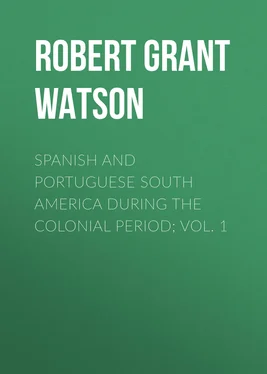Robert Grant Watson - Spanish and Portuguese South America during the Colonial Period; Vol. 1
Здесь есть возможность читать онлайн «Robert Grant Watson - Spanish and Portuguese South America during the Colonial Period; Vol. 1» — ознакомительный отрывок электронной книги совершенно бесплатно, а после прочтения отрывка купить полную версию. В некоторых случаях можно слушать аудио, скачать через торрент в формате fb2 и присутствует краткое содержание. Жанр: foreign_prose, История, foreign_edu, foreign_antique, на английском языке. Описание произведения, (предисловие) а так же отзывы посетителей доступны на портале библиотеки ЛибКат.
- Название:Spanish and Portuguese South America during the Colonial Period; Vol. 1
- Автор:
- Жанр:
- Год:неизвестен
- ISBN:нет данных
- Рейтинг книги:5 / 5. Голосов: 1
-
Избранное:Добавить в избранное
- Отзывы:
-
Ваша оценка:
- 100
- 1
- 2
- 3
- 4
- 5
Spanish and Portuguese South America during the Colonial Period; Vol. 1: краткое содержание, описание и аннотация
Предлагаем к чтению аннотацию, описание, краткое содержание или предисловие (зависит от того, что написал сам автор книги «Spanish and Portuguese South America during the Colonial Period; Vol. 1»). Если вы не нашли необходимую информацию о книге — напишите в комментариях, мы постараемся отыскать её.
Spanish and Portuguese South America during the Colonial Period; Vol. 1 — читать онлайн ознакомительный отрывок
Ниже представлен текст книги, разбитый по страницам. Система сохранения места последней прочитанной страницы, позволяет с удобством читать онлайн бесплатно книгу «Spanish and Portuguese South America during the Colonial Period; Vol. 1», без необходимости каждый раз заново искать на чём Вы остановились. Поставьте закладку, и сможете в любой момент перейти на страницу, на которой закончили чтение.
Интервал:
Закладка:
It is only fair to the early Spanish settlers in America, the account of whose proceedings in respect to the Indians cannot fail to rouse feelings of horror and disgust, that we should duly consider and weigh the feelings of the age in which they lived on the part of Christendom towards all who were beyond its pale. They were in fact the feelings of the chosen people towards the surrounding heathen, who were only deserving of being spared on condition of their becoming hewers of wood and drawers of water. It is true that in the case of a number of Spanish leaders, including Columbus himself and his brother Don Bartholomew, the Indians were to be spared and protected on the condition of their accepting the yoke imposed upon them and fulfilling the tasks assigned to them by their invaders; but upon the slightest resistance or evasion of their duties, all their natural rights were at once abrogated, and they became as so many beasts of burden, to be employed at the pleasure of their drivers. Amongst rulers and governors Queen Isabella stands out alone to protest against such a construction of the duties of one race towards another, even although the one were Christian and the other heathen.
But yet, seeking to make every allowance that can be urged in excuse or palliation, there is but one verdict that can possibly be given as to the general conduct of the Spaniards towards the natives of America, namely, that it surpassed in remorseless, and often stupid and short-sighted, cruelty the conduct of any one conquering or so-called “superior” race towards another conquered or “inferior” race of which history contains any record. In this respect we cannot but think that the Spaniards as a race have been too leniently judged by modern writers—not Spanish, but foreign. Much, for instance, as Washington Irving is to be admired for his clear judgment and his mastery of his subject, we cannot help thinking that he is scarcely justified in assigning the undoubted excesses committed by Spaniards in the New World merely to a set of ruthless adventurers, the scum of their race, rather than to Spaniards in general. It would of course be in the highest degree unjust to make an entire people responsible for the wholesale atrocities of two unlettered adventurers such as Pizarro and Almagro; but the accusation of scandalous and intolerable rapacity and cruelty is unfortunately not confined to the class to which such men belong; it applies equally to all ranks and grades of the invaders, with here and there a notable exception—generally, but not always, on the part of one or more churchmen—most of all in Las Casas.
The conduct of Ovando towards the natives of Hispaniola , and more particularly to those of Xaragua , is one of the many instances in question of the inhuman treatment of Indians by a Spaniard of the highest rank. It will be remembered that on one occasion some eighty caciques were treacherously seized, and upon mere unfounded suspicion, bound to posts and committed to the flames. It was estimated that at the time of the advent of the Spaniards the unfortunate island of Hayti contained about a million or twelve hundred thousand inhabitants—some writers place the population at a much larger amount,—yet in an incredibly short period, under the government of Ovando, it was reduced to twelve thousand, so reduced, indeed, that labourers had to be brought from other islands. And yet Ovando had been specially selected for his “prudence,” in order that he might redress the wrongs to which the Indians were said to be subjected under the government of Columbus and his brother, and the Indians were specially commended to his care by Queen Isabella.
It may be said that the conduct of one tyrannical governor should not be charged to the discredit of a people. This would be a fair argument had Ovando been promptly recalled when the news of his atrocities at Xaragua reached Spain, as was in our own day Governor Eyre, when the news of his high-handed proceedings in Jamaica reached England. Ovando’s proceedings were indeed so repugnant to the humane heart of Isabella that with her dying breath she exacted a promise from Ferdinand that he should be recalled from his government. He was, later on, recalled, but only after the lapse of four years, and when Don Diego Columbus had been declared by the courts of justice to be entitled to the government of Hispaniola . The long period which elapsed between the fate of Anacoana and the recall of Ovando showed that neither his king nor the public feeling of Spain in general was much shocked by the proceedings which have left an indelible stain upon his name.
But it cannot be imagined that the wholesale depopulation of Hayti is chargeable merely to one or more governors. It is to be attributed indiscriminately to the colonists in general, and amongst them were many cavaliers who had gone to seek their fortune in the New World in the train of Ovando. If we turn in other directions we see merely a repetition of the same facts. Cortez and many of his compeers were men of noble family; but in the history of their deeds we find at least equal cruelty, as regards the natives, with that which attended the proceedings of such low-born adventurers as Pizarro and Almagro. Whilst excellent laws and regulations for the well-being and proper treatment of the natives of America were constantly being enacted in Spain, we nowhere read of wholesome examples being made of the wrong-doers who treated these laws as a dead letter. Even the laws and regulations, good and well meant as they were, were not the result of the reaction of public opinion against the ill-treatment of the Indians, but were brought about by a few humane ecclesiastics who had been helpless eye-witnesses of the atrocities committed by their countrymen, and who returned to Spain with the hope of rousing the conscience of the sovereign and his advisers to a sense of the enormities which were being daily committed in his name. This brings us to the historical part played by Las Casas on the continent of South America; but before describing it, it may be well to give a brief statement of what had already been done by other ecclesiastics in the same cause.
The Dominican monks of Hispaniola , grieved at the barbarities practised towards the natives of that unfortunate island, had entered an indignant protest against the treatment which was meted out to the vassals of Queen Isabella. These monks were about twelve or fifteen in number, and they soon gathered for themselves an idea of the cruelties which were being practised around them. As they determined that their protest should be a collective one, they agreed that a discourse should be preached before the inhabitants of San Domingo , to which they should all attach their names. The preacher, taking for his text “I am the voice of one crying in the wilderness,” declared to his audience with piercing words that they were living; in mortal sin by reason of their tyranny to the Indians, and he demanded what authority there was for the imposition of this servitude, and what ground for these wars? The sermon was heard to the end, but on reflection the principal persons amongst the audience went to the monastery to make a fierce remonstrance.
They insisted on seeing the preacher, and required that he should make a retractation on the following Sunday. Next Sunday came, and the place of worship was crowded by a congregation brought together to hear the expected apology. The same preacher again ascended the pulpit; but Father Antonio only repeated his former statements and insisted upon their conclusions. He moreover added that the Dominicans would not confess any man who should have made incursions amongst the Indians. The congregation again listened to the discourse; but they determined to send a complaint to the king, and afterwards to despatch a Franciscan monk to argue their case at court. Thus were two orders of the Church arrayed against each other; the one urged on by motives of Christianity and humanity, the other by religious rivalry.
Читать дальшеИнтервал:
Закладка:
Похожие книги на «Spanish and Portuguese South America during the Colonial Period; Vol. 1»
Представляем Вашему вниманию похожие книги на «Spanish and Portuguese South America during the Colonial Period; Vol. 1» списком для выбора. Мы отобрали схожую по названию и смыслу литературу в надежде предоставить читателям больше вариантов отыскать новые, интересные, ещё непрочитанные произведения.
Обсуждение, отзывы о книге «Spanish and Portuguese South America during the Colonial Period; Vol. 1» и просто собственные мнения читателей. Оставьте ваши комментарии, напишите, что Вы думаете о произведении, его смысле или главных героях. Укажите что конкретно понравилось, а что нет, и почему Вы так считаете.












